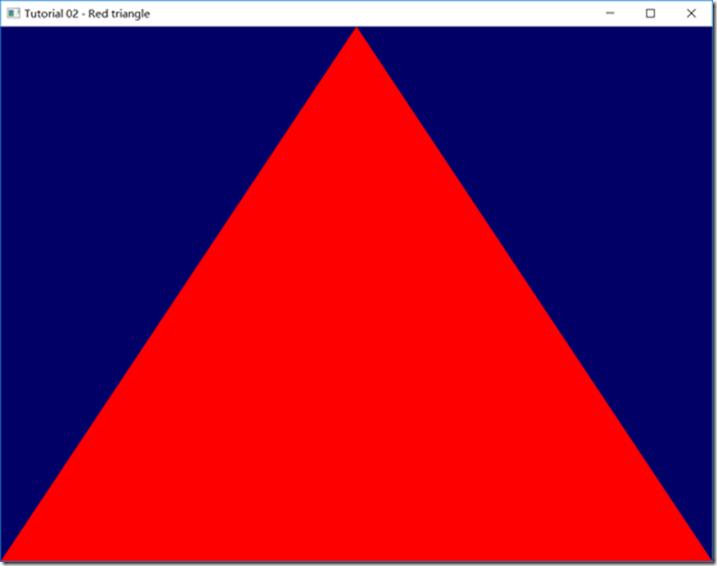OpenGL学习--02--绘制一个红色三角形
Posted ParamousGIS
tags:
篇首语:本文由小常识网(cha138.com)小编为大家整理,主要介绍了OpenGL学习--02--绘制一个红色三角形相关的知识,希望对你有一定的参考价值。
The OpenGL buffer is created, bound, filled and configured with the standard functions (glGenBuffers, glBindBuffer, glBufferData, glVertexAttribPointer) ;
1.tutorial02.cpp
// Include standard headers #include <stdio.h> #include <stdlib.h> // Include GLEW #include <GL/glew.h> // Include GLFW #include <glfw3.h> GLFWwindow* window; // Include GLM #include <glm/glm.hpp> using namespace glm; #include <common/shader.hpp> int main( void ) { // Initialise GLFW if( !glfwInit() ) { fprintf( stderr, "Failed to initialize GLFW\\n" ); getchar(); return -1; } glfwWindowHint(GLFW_SAMPLES, 4); glfwWindowHint(GLFW_CONTEXT_VERSION_MAJOR, 3); glfwWindowHint(GLFW_CONTEXT_VERSION_MINOR, 3); glfwWindowHint(GLFW_OPENGL_FORWARD_COMPAT, GL_TRUE); // To make MacOS happy; should not be needed glfwWindowHint(GLFW_OPENGL_PROFILE, GLFW_OPENGL_CORE_PROFILE); // Open a window and create its OpenGL context window = glfwCreateWindow( 1024, 768, "Tutorial 02 - Red triangle", NULL, NULL); if( window == NULL ){ fprintf( stderr, "Failed to open GLFW window. If you have an Intel GPU, they are not 3.3 compatible. Try the 2.1 version of the tutorials.\\n" ); getchar(); glfwTerminate(); return -1; } glfwMakeContextCurrent(window); // Initialize GLEW glewExperimental = true; // Needed for core profile if (glewInit() != GLEW_OK) { fprintf(stderr, "Failed to initialize GLEW\\n"); getchar(); glfwTerminate(); return -1; } // Ensure we can capture the escape key being pressed below glfwSetInputMode(window, GLFW_STICKY_KEYS, GL_TRUE); // Dark blue background glClearColor(0.0f, 0.0f, 0.4f, 0.0f); GLuint VertexArrayID; glGenVertexArrays(1, &VertexArrayID); glBindVertexArray(VertexArrayID); // Create and compile our GLSL program from the shaders GLuint programID = LoadShaders( "SimpleVertexShader.vertexshader", "SimpleFragmentShader.fragmentshader" ); static const GLfloat g_vertex_buffer_data[] = { -1.0f, -1.0f, 0.0f, 1.0f, -1.0f, 0.0f, 0.0f, 1.0f, 0.0f, }; GLuint vertexbuffer; glGenBuffers(1, &vertexbuffer); glBindBuffer(GL_ARRAY_BUFFER, vertexbuffer); glBufferData(GL_ARRAY_BUFFER, sizeof(g_vertex_buffer_data), g_vertex_buffer_data, GL_STATIC_DRAW); do{ // Clear the screen glClear( GL_COLOR_BUFFER_BIT ); // Use our shader glUseProgram(programID); // 1rst attribute buffer : vertices glEnableVertexAttribArray(0); glBindBuffer(GL_ARRAY_BUFFER, vertexbuffer); glVertexAttribPointer( 0, // attribute 0. No particular reason for 0, but must match the layout in the shader. 3, // size GL_FLOAT, // type GL_FALSE, // normalized? 0, // stride (void*)0 // array buffer offset ); // Draw the triangle ! glDrawArrays(GL_TRIANGLES, 0, 3); // 3 indices starting at 0 -> 1 triangle glDisableVertexAttribArray(0); // Swap buffers glfwSwapBuffers(window); glfwPollEvents(); } // Check if the ESC key was pressed or the window was closed while( glfwGetKey(window, GLFW_KEY_ESCAPE ) != GLFW_PRESS && glfwWindowShouldClose(window) == 0 ); // Cleanup VBO glDeleteBuffers(1, &vertexbuffer); glDeleteVertexArrays(1, &VertexArrayID); glDeleteProgram(programID); // Close OpenGL window and terminate GLFW glfwTerminate(); return 0; }
2. common/shader.cpp
#include <stdio.h> #include <string> #include <vector> #include <iostream> #include <fstream> #include <algorithm> using namespace std; #include <stdlib.h> #include <string.h> #include <GL/glew.h> #include "shader.hpp" GLuint LoadShaders(const char * vertex_file_path,const char * fragment_file_path){ // Create the shaders GLuint VertexShaderID = glCreateShader(GL_VERTEX_SHADER); GLuint FragmentShaderID = glCreateShader(GL_FRAGMENT_SHADER); // Read the Vertex Shader code from the file std::string VertexShaderCode; std::ifstream VertexShaderStream(vertex_file_path, std::ios::in); if(VertexShaderStream.is_open()){ std::string Line = ""; while(getline(VertexShaderStream, Line)) VertexShaderCode += "\\n" + Line; VertexShaderStream.close(); }else{ printf("Impossible to open %s. Are you in the right directory ? Don\'t forget to read the FAQ !\\n", vertex_file_path); getchar(); return 0; } // Read the Fragment Shader code from the file std::string FragmentShaderCode; std::ifstream FragmentShaderStream(fragment_file_path, std::ios::in); if(FragmentShaderStream.is_open()){ std::string Line = ""; while(getline(FragmentShaderStream, Line)) FragmentShaderCode += "\\n" + Line; FragmentShaderStream.close(); } GLint Result = GL_FALSE; int InfoLogLength; // Compile Vertex Shader printf("Compiling shader : %s\\n", vertex_file_path); char const * VertexSourcePointer = VertexShaderCode.c_str(); glShaderSource(VertexShaderID, 1, &VertexSourcePointer , NULL); glCompileShader(VertexShaderID); // Check Vertex Shader glGetShaderiv(VertexShaderID, GL_COMPILE_STATUS, &Result); glGetShaderiv(VertexShaderID, GL_INFO_LOG_LENGTH, &InfoLogLength); if ( InfoLogLength > 0 ){ std::vector<char> VertexShaderErrorMessage(InfoLogLength+1); glGetShaderInfoLog(VertexShaderID, InfoLogLength, NULL, &VertexShaderErrorMessage[0]); printf("%s\\n", &VertexShaderErrorMessage[0]); } // Compile Fragment Shader printf("Compiling shader : %s\\n", fragment_file_path); char const * FragmentSourcePointer = FragmentShaderCode.c_str(); glShaderSource(FragmentShaderID, 1, &FragmentSourcePointer , NULL); glCompileShader(FragmentShaderID); // Check Fragment Shader glGetShaderiv(FragmentShaderID, GL_COMPILE_STATUS, &Result); glGetShaderiv(FragmentShaderID, GL_INFO_LOG_LENGTH, &InfoLogLength); if ( InfoLogLength > 0 ){ std::vector<char> FragmentShaderErrorMessage(InfoLogLength+1); glGetShaderInfoLog(FragmentShaderID, InfoLogLength, NULL, &FragmentShaderErrorMessage[0]); printf("%s\\n", &FragmentShaderErrorMessage[0]); } // Link the program printf("Linking program\\n"); GLuint ProgramID = glCreateProgram(); glAttachShader(ProgramID, VertexShaderID); glAttachShader(ProgramID, FragmentShaderID); glLinkProgram(ProgramID); // Check the program glGetProgramiv(ProgramID, GL_LINK_STATUS, &Result); glGetProgramiv(ProgramID, GL_INFO_LOG_LENGTH, &InfoLogLength); if ( InfoLogLength > 0 ){ std::vector<char> ProgramErrorMessage(InfoLogLength+1); glGetProgramInfoLog(ProgramID, InfoLogLength, NULL, &ProgramErrorMessage[0]); printf("%s\\n", &ProgramErrorMessage[0]); } glDetachShader(ProgramID, VertexShaderID); glDetachShader(ProgramID, FragmentShaderID); glDeleteShader(VertexShaderID); glDeleteShader(FragmentShaderID); return ProgramID; }
3.common/shader.hpp
#ifndef SHADER_HPP #define SHADER_HPP GLuint LoadShaders(const char * vertex_file_path,const char * fragment_file_path); #endif
4.shaders/SimpleFragmentShader.fragmentshader
#version 330 core // Ouput data out vec3 color; void main() { // Output color = red color = vec3(1,0,0); }
5.shaders/SimpleVertexShader.vertexshader
#version 330 core // Input vertex data, different for all executions of this shader. layout(location = 0) in vec3 vertexPosition_modelspace; void main(){ gl_Position.xyz = vertexPosition_modelspace; gl_Position.w = 1.0; }
以上是关于OpenGL学习--02--绘制一个红色三角形的主要内容,如果未能解决你的问题,请参考以下文章
